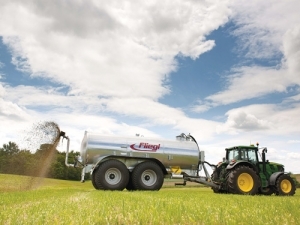Slurry tankers have traditionally been simply a means of dealing with smelly waste.
However, for the last few years, driven by environmental issues, interest has grown in getting the right machine for the job and trying to realise the nutrient benefits of the waste.
The Fliegel VFW range, distributed here by Claas Harvest Centres, uses the latest manufacturing techniques to make it stand out from the crowd; it offers units of 7500-30000L capacity.
The mainstream market is taken care of by single-axle models of 7500-10,600L; bigger users can choose tandem axle units from 10,600-18,000L.
Construction is centred on the use of hot-dipped galvanised steel to ensure corrosion resistance and a durable long life and this is used extensively for the tank and chassis components.
Standard features – for a fast turnaround – include high capacity vacuum pumps (10,000-14,000L/min), a 150mm quick coupler, liquid level indicators, on-board hose storage and a 600mm access hatch for easy cleaning.
Customer-specified options include suspended and hydraulically adjusted drawbars, filling options such as auto-couplers, powered fill and hydraulically driven agitators to improve flow and prevent blockages.
An optional moveable axle (manual or hydraulic) transfers weight to the tractor hitch when moved rearwards in difficult conditions, or vice versa when used for long distance transport. Hydraulic brakes are fitted as standard, and air variants as options.
At the business end, standard application is by a simple splash plate system, although users wanting to make best use of available nutrients might wish to specify an optional dribble bar or disc injector layout. The former is available in 9-18m spreading widths and the injection rigs from 3-8m wide.
Also optional are flow meters to record volumes applied.
www.claasharvestcentre.co.nz











